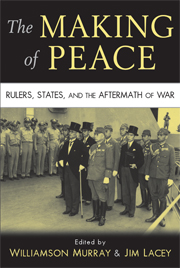Book contents
- Frontmatter
- Contents
- Preface: concluding peace
- 1 Introduction: searching for peace
- 2 The Peace of Nicias
- 3 “A swift and sure peace”: the Congress of Westphalia 1643–1648
- 4 The Peace of Paris, 1763
- 5 In search of military repose: the Congress of Vienna and the making of peace
- 6 War and peace in the post–Civil War South
- 7 Vae victoribus: Bismarck's quest for peace in the Franco-Prussian War, 1870–1871
- 8 Versailles: the peace without a chance
- 9 “Building buffers and filling vacuums”: Great Britain and the Middle East, 1914–1922
- 10 Mission improbable, fear, culture, and interest: peace making, 1943–1949
- 11 The economic making of peace
- 12 Ending the Cold War
- 13 Conclusion: history and the making of peace
- Index
- References
7 - Vae victoribus: Bismarck's quest for peace in the Franco-Prussian War, 1870–1871
Published online by Cambridge University Press: 05 June 2012
- Frontmatter
- Contents
- Preface: concluding peace
- 1 Introduction: searching for peace
- 2 The Peace of Nicias
- 3 “A swift and sure peace”: the Congress of Westphalia 1643–1648
- 4 The Peace of Paris, 1763
- 5 In search of military repose: the Congress of Vienna and the making of peace
- 6 War and peace in the post–Civil War South
- 7 Vae victoribus: Bismarck's quest for peace in the Franco-Prussian War, 1870–1871
- 8 Versailles: the peace without a chance
- 9 “Building buffers and filling vacuums”: Great Britain and the Middle East, 1914–1922
- 10 Mission improbable, fear, culture, and interest: peace making, 1943–1949
- 11 The economic making of peace
- 12 Ending the Cold War
- 13 Conclusion: history and the making of peace
- Index
- References
Summary
Vae victoribus! Victory is a poor advisor, and nations tend to slip on the blood they have shed. Rome under its Caesers did not suspect that its Vae victis would apply in equal measure to Rome itself. After every victory, there's a new tomorrow. Waterloo follows Austerlitz. And so, too, our cry: Victor, beware!
“En campagne,” L'illustration, 13 September 1870, a Parisian weekly. An admonition from Neue Freie Presse, a Viennese daily, addressed to Prussia.On 20 July 1870, the French ambassador to the United States, Lucien-Anatole Prevost-Paradol, shot himself in a hotel room in Washington, DC after learning that the government of Napoleon III had declared war on Prussia and its allied German states of the North German Confederation. Not from anguish over the possible fate of the Napoleonic regime did he commit suicide; indeed, as a prominent journalist and member of the liberal opposition, he had no great love for the empire. He had offered his services to Napoleon only as recently as 1869 during the brief period of liberalization that immediately preceded the outbreak of the war. Most likely, he acted out of distress at the disastrous outcome such a war, won or lost, implied for France.
Only two years before, Prevost-Paradol had published La France nouvelle, an extraordinarily prophetic account of the Franco-Prussian rivalry, which had depicted the two states speeding toward one another like trains on a collision course.
- Type
- Chapter
- Information
- The Making of PeaceRulers, States, and the Aftermath of War, pp. 176 - 207Publisher: Cambridge University PressPrint publication year: 2008

